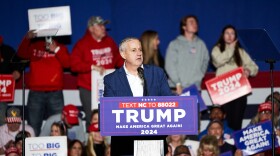The issue of rising interest rates on government subsidized student loans wasn’t a topic on most people’s minds until about a year ago. That’s when President Barack Obama stepped onto the stage at UNC-Chapel Hill’s Memorial Auditorium and “slow-jammed the news” with late show host Jimmy Fallon.
The President’s strategy worked in two ways. First, he was re-elected. And second, he was able to push back, by one year, an interest-rate hike on student loans.
That moratorium ended July first. That day, student loan rates doubled, from 3.4% to 6.8%.
The first effort to deal with the issue came from the U.S. House a month or so before the deadline. That’s when North Carolina Congresswoman Virginia Foxx, chair of the Higher Education Sub-committee, sponsored a bill.
Foxx, a Republican, is a Tea Party favorite. She’s been an educator, an administrator at Appalachian State, and a community college president. She’s also a classic pick-yourself-up-by-your-own-bootstraps story, coming from a very poor background to pay her own way through UNC-Chapel Hill.
She made her feelings on student loans very clear on the G. Gordon Liddy radio program last year.
“I have very little tolerance for people who tell me they graduate with $200,000 in debt, or even $80,000 in debt,” she said. “Because there’s no reason for that. I remind folks all the time that the Declaration of Independence says life, liberty, and the pursuit of happiness. You don’t sit on your butt and have it dumped in your lap.”
So it might be surprising then that the bill she co-sponsored and the House passed with bi-partisan support is aligned closely with President Obama’s plan to re-vamp student loan interest rates. Both tie the student loan rate to the variable rates of the 10-year Treasury bond.
“We think the market-based approach is the best approach,” Foxx told WUNC.
Most Democrats disagree with Foxx - and the President. They say the rates would be too high. North Carolina Senator Kay Hagan co-sponsored a bill that would extend the lower rate for another year. She also supports a provision to put a cap on the rate for student loans.
“Without a cap, our young people are going to be borrowing money to get educated with no idea in mind as to what these rates could go to over the number of years it’s going to take them to get those loans paid back,” said Hagan.
A slightly higher cap was also in the House bill – but Hagan’s Senate bill failed to get the 60 votes needed for cloture earlier this week. Enter North Carolina’s other senator, Republican Richard Burr. He’s part of a bi-partisan group of senators that proposed a bill similar to the House’s and to the President’s – again tying the student loan interest rate to the treasury bonds - one that included the slightly-higher cap.
On Wednesday, that bi-partisan bill looked like it could break the political logjam in the Senate. But then the Congressional Budget Office estimated yesterday that it would cost $22 billion over 10 years. That slowed momentum, and now it could be dead again.
“It’s unfortunate, is all I can say,” said Foxx. “They tout themselves as the place where you can get bi-partisan agreement on things. So what do you think about the prospects moving forward? I’m always optimistic. And again, the differences between us and the President are very minor, very technical in nature.”
Foxx, Hagan, and Burr say they will keep trying to get a student loan law passed. But next week, the Senate is likely to turn its attention to filibuster reform, before going on recess in August.
And if something doesn’t get done, that could leave nearly 200,000 North Carolina college students paying much higher rates on their student loans when they enroll in classes this fall.






